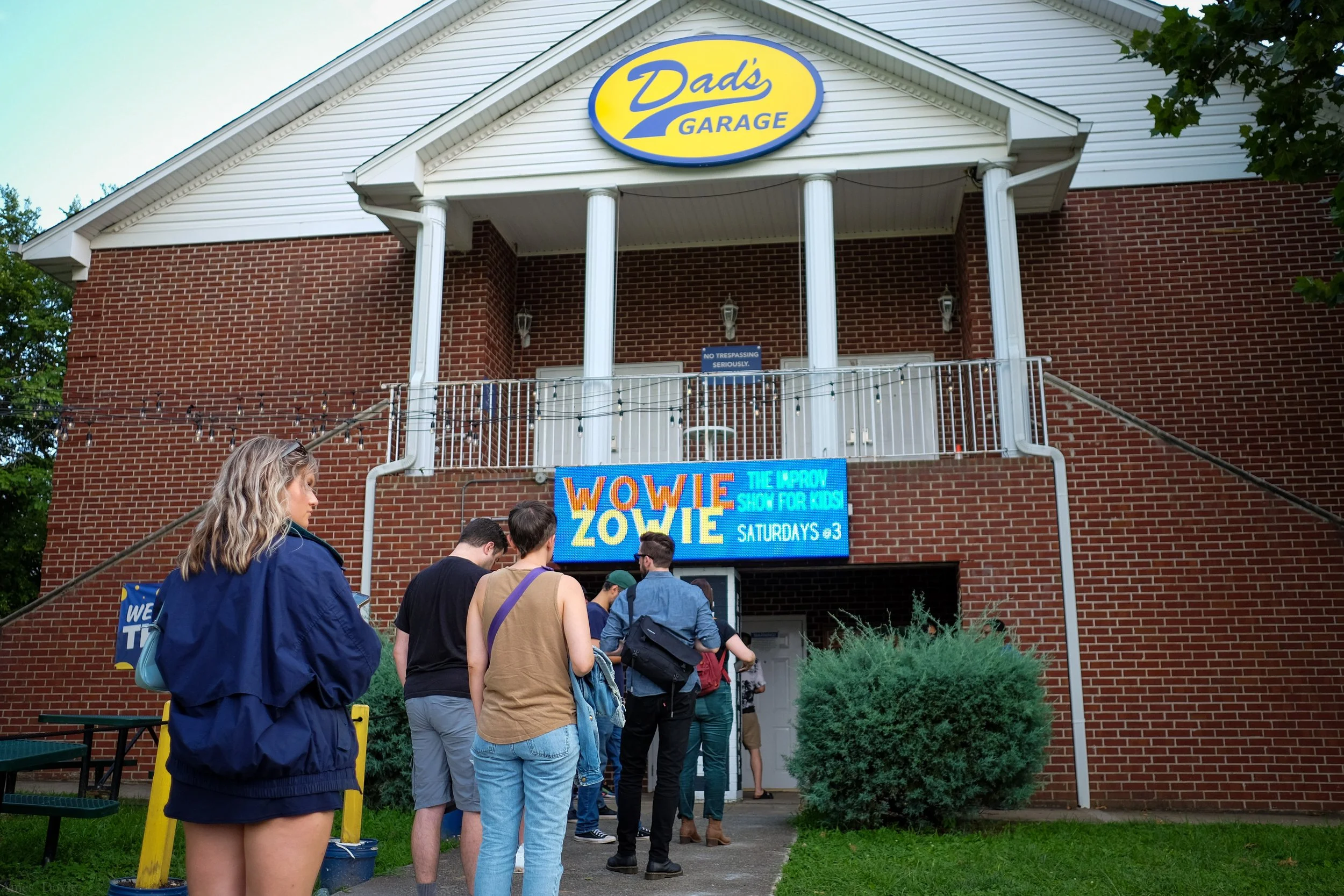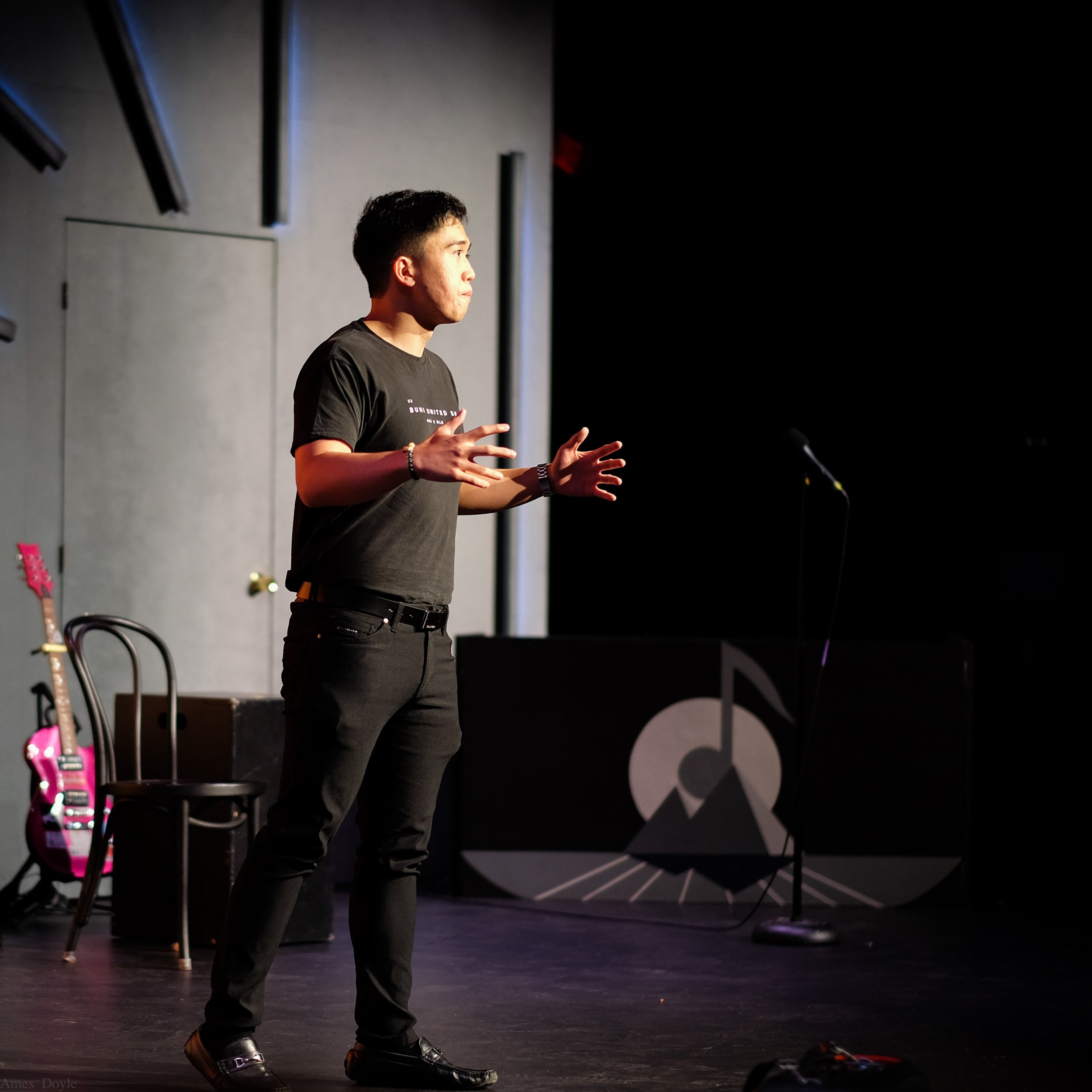Live From Dad’s: It’s Friday Night!
By: Ames Doyle
Photo credit: Ames Doyle
The green room at Dad’s Garage hums with energy as the actors pace back and forth, alternating between jittery chatter and somber line recitation. Nerves are standard fare in a theater, but tonight the stakes are higher than they’ve ever been. For the first time ever, a major television show (which shall not be named) is hosting auditions in Atlanta, exclusively within the hallowed halls of the city’s favorite improv house.
Since its inception in 1995, Dad’s Garage has been well renowned in the southeast, regularly featuring big name celebrities and producing breakthrough scripted works such as Cannibal! The Musical, Wicket, and Black Nerd. Over the course of twenty-nine years, the theater has developed a reputation as a collaborative wellspring for Atlanta performers while endearing itself in the hearts of locals and visitors alike with tongue-in-cheek, uproarious comedy. Despite the acclaim, it’s been a challenge for members to find access to resources normally afforded to other big city improvisational outfits—namely representation and screen opportunities.
Photo credit: Ames Doyle
When the film and television community migrated from L.A. to Atlanta, creatives on the production and post-production side of film and television found themselves suddenly in high demand, with an influx of jobs that outnumbered the amount of people available to take them. Given this, performers had reason to hope that their dreams, too, would be realized and casting calls would soon be rife with possibilities. The renaissance, to everyone's dismay, didn’t quite come to fruition. On-camera creatives struggled (and continue to struggle) to claim space beyond extra work or supporting roles. Even higher paying production positions like directing and producing are outsourced to Hollywood studio darlings.
In an effort to help turn the tide, the artistic staff at Dad’s, in partnership with Vaguely Specific Productions, began hosting showcases of their own. These productions offered a chance for seasoned performers to hone their craft and prove their mettle to top industry brass, from agents to producers to casting directors, with resounding success; the number of participants who walked away from a showcase with representation was not insignificant, proving indisputably, as André 3000 once wisely said, “the south got something to say.”
Photo credit: Ames Doyle
Being heard, however, is another story. In major comedy hubs like Chicago or New York, industry standard has developed over the course of decades, creating an in-the-know community of diverse performers who are well schooled in how to deliver a seamless “tight five”—a five minute, audience-tested routine of a comedian’s sketch or stand-up material that remains consistently popular—which is a necessity for a shot at being discovered through a showcase. Competition in these theaters is, in a word, fierce. Spots are highly coveted and timing is absolutely everything, but the system is a well-oiled machine for those with the chops to make it big.
When news spread of the aforementioned tv execs' visit to Atlanta, hoards of performers sprung into action to prepare their best work before the looming deadline. Dad’s Artistic Director Tim Stoltenberg and Associate Artistic Director Eve Krueger (both previous members of Chicago’s Second City) swiftly organized workshops for solo sketch work, joke writing and showcase preparation. Ensemble and conservatory members were given first dibs at the sixty slots available in the initial round of auditions, with remaining spots going on a first-come-first-served basis to neighboring theaters and previous showcase participants. The new industry standard was being collectively built in real time across the comedic community.
Photo credit: Ames Doyle
The semi-final round of auditions cut the initial sixty performers down to twenty and provided an unspecified timeline for the chosen few to sharpen their act further before the final showcase. When the execs would be back, no one knew, but the time had to be put to good use, however much of it there was. Dad’s higher ups provided solo coaching for intensive instruction and further workshop training, performers jumped into improv shows to exercise their creative muscles. One month later, the call came in: everything had to be in place by the following Friday.
Which brings us to tonight, the evening of August 2, 2024. Word is out about the nature of the Co-Lab Showcase; every seat in the theater is spoken for and a waitlist with seventy names on it has continued to fill even as the doors open. The bar area, decked out with extra chairs, is prepped for live viewing on the theater’s big screen tv, usually reserved for announcements and coming attractions. The line to get in snakes around the building and the crush of attendees start to make their way up the staircase to the Main Stage.
At 8 p.m. sharp, Executive Producer Jon Carr steps on the stage. It’s very important, he tells the hushed crowd, to react honestly and loudly-—tonight should be funny, after all, and our approval could mean a life changing opportunity for someone. Excitement ripples through the room, the entire audience ready to “yes, and” their favorite performers into a new stratosphere of super stardom and put Atlanta on the comedy map. A deafening wave of applause rushes over as the first actor, Phong Le, takes the stage. The show has begun and history is about to be made.
Photo credit: Ames Doyle





